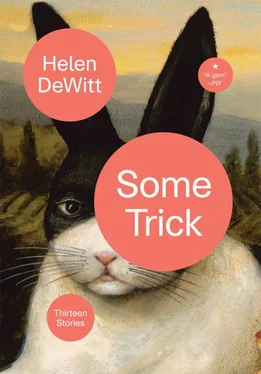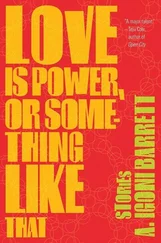The Woodfords taught her to play bridge. This would turn out to be important.
An economist taught her to play poker. This would turn out to be important.
This could go on and on but it can’t go on.
Cultiver son jardin : 1988–2002
In 1988 Plantinga rented a room in East Dulwich from the Estonian minimalist Liis Rüütel. Rüütel had squatted a house in Bermondsey with the installation artist Andrew Hopkins; had learnt construction techniques (plumbing, wiring, plastering, carpentry); had taught at Goldsmith’s and Central Saint Martins; had bought a condemned house for peanuts, restored it, rented out rooms, and given up teaching. She would say that her painting got all this energy from the fact that she was not teaching, she was not putting all this energy into the students. Because Plantinga was not a student, because she was just living in the house, she was there at this burst of energy. The attention was directed entirely at the art and not at her, so that’s paradoxical, that she would get more than she would get from the thing you put on a CV. She could go to the studio and hear the words that happened to come, words hitting the air the way paint strikes a canvas, not congealed to the illusion of authority, of definitiveness, that you get from a text on a printed page. She could see something you don’t see so much in a gallery, the historical development of the artist, the work the artist has left behind next to the new. And then there was this other thing, there was the transmission of the praxis of Andrew Hopkins into the plumbing and a kitchen cabinet and a light fixture and after a while a conservatory at the back, you would have these dense minimalist paintings next to the fixture, these different flows of things going through the hands. It goes without saying that you can take pictures. Of course after a while they want you to take pictures for catalogues.
It doesn’t go without saying. When she was a child she blocked out Estonian. If her mother spoke to her aunt she would disunderstand, because her mother spoke comical German and it was embarrassing. But Liis Rüütel had this mastery of English, she could articulate a point about the Kantian sublime and explain how to disconnect the water supply to a sink and then effortlessly use words like wally and boffin and bollix , if she wrote an advert on eBay to sell a toaster you were completely transfixed. So it was as if Estonian had been developing for 30 years in the brain of Plantinga, if Liis got on the phone to her sister comprehension would click into place, Liis would get off the phone and Estonian words would come suddenly to the mouth that would not speak to its aunt or its mother, and at the same time it was as if the brain had been waiting for concrete proof that English was possible for an interloper, it clicked into place — if you are a photographer you notice when something teaches you about time.
And then there was a different period. Rüütel’s gallerist took 20 paintings to Frieze and it was a sensation, they all sold within hours, so of course Liis thought it would not be necessary to rent rooms. But the gallery kept not sending money, there were these long conversations on the phone, and each time Liis would go into the garden and dig and plant and put down paving stones. Plantinga wasn’t living there any more but each time she went back there would be this new transformation of the garden or maybe a new upstairs kitchen. So of course these are pictures that have to be taken before you know what to do with them, you come back and there is a pond with a natural waterfall and a rocky basin and carp and a Japanese maple. It’s like, if you go to the Colorado River you see where the water has cut down through the layers of rock through the millennia.
She played poker at the Vic on Edgware Road.
She played bridge at the Young Chelsea Club. She really did.
You have to remember that she had gone to seminars on the Philosophical Investigations . She could develop her thought on language games and interaction rituals. She could pay the rent and buy kit without schmoozing her gallerist. She had posh friends who played Flannery Two Diamonds & thought nothing of buying 5 prints.
Getting Ready for Dinner with a Gay Friend : 2003–4
The Role of Expressiveness in Human-Robot Interaction : 2003–4
This was a bit mischievous. Well, it was bad. It was bad. Ivo is not on speaking terms with her, so yes, it was mischievous.
She got a place as artist-in-residence at the Robotics Institute at Carnegie Mellon in Pittsburgh. There is a big Polish population in Pittsburgh, so what she did was, she got people to make recordings of Bajki robotów in Polish, and then she got a guy at the institute to make robots that would tell the stories, and then she made a video of autistic children interacting contentedly with the robots.
So Pittsburgh, as maybe you know, is built at the confluence of three rivers; you can take a trolley car up to the bluff overlooking the city and you get a view of the rivers and these dozens of little suspension bridges which you have to love. She ran into a girl who said someone had offered to pay her rent for a year. He wanted to take a photograph of this view as seen from the interior of an apartment in which someone was living in a completely natural way. All she had to do was move in and furnish it the way she would naturally. His idea was that she would be engaged in some kind of activity, ironing napkins or something like that. What he wanted was to juxtapose this ordinary, everyday activity with the traces of this steel town.
Ordinary! Everyday! She could see that the girl was completely gobsmacked.
The girl was an art student. She did not even have an iron. She did not even have paper napkins, if she had people over for a meal she would tear off paper towels. But as soon as she moved in she bought an iron and an ironing board, and she bought some cloth napkins, and if you are going to have cloth napkins maybe you need a tablecloth so she bought a matching tablecloth. And maybe she would have reverted to natural behavior, but Ivo kept saying, I just want you engaging in some ordinary, everyday activity, something like vacuuming, or dusting. So of course then she had to buy a vacuum cleaner and a dust cloth, and of course Ivo would come over to experiment with the light at different times of day so she would feel the apartment had to look presentable for the kind of person who thinks vacuuming is an everyday activity. So she became fanatical about housekeeping, she would vacuum, she would wash all the dishes and put them away, she bought a teapot and a creamer and a sugar bowl and a little tray and a glass plate for cookies.
It was like an extreme form of this phenomenon that’s really common, which is that when you have gay friends to dinner you suddenly remember that they had hand towels and scented soap in the bathroom and you are conscious of living in squalor. Or at least, she thought it was like this phenomenon, but that was just the perception of the possessor of the mechanical eye. She had some money at this point. She rented an apartment, and she found a girl to live in it, and she said she would leave her assistant to handle the details. One of the reasons she loved gay bars, of course, is that there is this fanatical attention to detail, and they cosset you, so you become aware that you can ritualize looking after someone and that doesn’t devalue it. So she asked Ed Vittorini, who ran her favorite bar, if he would take care of this; she said she was going to want the inhabitant engaged in some ordinary, everyday activity, and he should just get her to act naturally, live naturally in the apartment. And of course, as it turned out, the end result was these two girls in an apartment with an ironing board and cloth napkins and a matching tablecloth and a tea tray and something in a clothes bag that had just been picked up from the dry cleaners and a vase of fresh flowers.
Читать дальше












